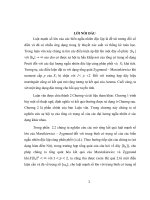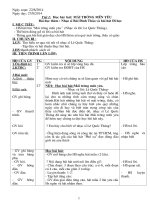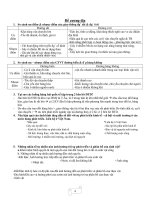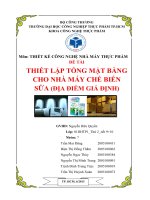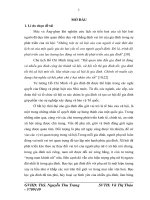tiếng anh 10 unit 1 vocabulary
Bạn đang xem bản rút gọn của tài liệu. Xem và tải ngay bản đầy đủ của tài liệu tại đây (167.23 KB, 11 trang )
UNIT 1: A DAY IN THE LIFE OF..........
I. READING
1. Daily routine(n): thói quen hằng ngày, công việc hằng ngày
2. Bank(n) [bæηk] : bờ
3. Boil (v) [bɔil]: luộc, đun sôi(nước)
4. Plough(v) [plau]: cày( ruộng)
5. Harrow(v) ['hærou]: bừa(ruộng)
6. Plot of land(exp): thửa ruộng
7. Fellow peasant(exp): bạn nông dân
8. Lead(v) [led]: dẫn, dắt(trâu)
9. Buffalo(n) ['bʌfəlou]: con trâu
10. Field(n) [fi:ld]:đồng ruộng, cánh đồng
11. Pump(v) [pʌmp]: bơm(nước)
12. Chat(v) [t∫æt]=talk in a friendly way: nói chuyện phím, tán gẫu
13. Crop(n) [krɔp]: vụ, mùa
14. Do the transplanting(exp) [træns'plɑ:ntin]: cấy( lúa)
15. Be contented with(exp) [kən'tentid]=be satisfied with(exp) ['sætisfaid]: hài lòng
16. Go off =ring(v): reo leo, reng len( chuông)
17. Get ready [get 'redi]= prepare(v) [pri'peə]: chuẩn bị
18. Be disappointed with(exp) [disə'pɔint]: thất vọng
19. Be interested in(exp) ['intristid] : thích thú, quan tâm
20. Go to bed(exp): đi ngủ (go-went-gone)
21. Go to school(exp): đi học
22. Have breakfast/lunch/dinner(exp) : ăn sáng/trưa/tối (have-had-had)
23. In the morning/afternoon/evening(exp): buổi sáng/chiều/tối
24. Get up(v): thức dậy (get-got-got)
25. Wake up [weik ʌp](v): thức giấc (wake-woke-waken)
26. Local tobacco: ['loukəl tə'bækou] : thuốc lào
27. Life(n) [laif]: cuộc sống
28. Lives(npl.) [laivz] cuộc sống
29. Cue(n) [kju:] : sự gợi ý, lời ám chỉ
30. Farmer(n) ['fɑ:mə]: nông dân
31. Alarm(n) [ə'lɑ:m]=alarm clock: đồng hồ báo thức
32. Break(n) [breik]: sự nghỉ
33. Take an hour’s rest: nghỉ ngơi 1 tiếng
34. Take a short rest(exp): nghỉ ngơi ngắn (take-took-taken)
35. Neighbor(n) ['neibə]: người láng giềng
36. See(v) [si:] thấy (see-saw-seen)
37. Option(n) ['ɔp∫n]sự chọn lựa, quyền lựa chọn
38. Italicised word: chữ in nghiêng
39. Meaning(n) ['mi:niη]: nghĩa
40. Suit(v) [sju:t] hợp với, thích hợp với
41. Go and see(exp)=visit(v) ['vizit]: viếng thăm
42. Occupation(n) [,ɒkjʊ'pei∫n]= job(n) [dʒɔb]: nghề nghiệp, công
a. việc.
II. SPEAKING
Tenth-grade student: học sinh lớp 10
Timetable(n) ['taimtəbl]=schedule(n) ['∫edju:l; 'skedʒul]: thời
1
gian biểu, thời khóa biểu .
Weekly(n) ['wi:kli]: hằng tuần
Civic education(n) ['sivik edju:'kei∫n]: giáo dục công dân
Technology(n) [tek'nɔlədʒi]: công nghệ học
Maths(n) [mæθ]: tóan học
Music(n) ['mju:zik]:nhạc, âm nhạc
Literature(n) ['litrət∫ə] : văn chương, văn học
Information technology(n) [ infə'mei∫n tek'nɔlədʒi ] : công nghệ thông tin.
Geography(n) [dʒi'ɔgrəfi] : địa lý học
History(n) ['histri] : lịch sử học
Chemistry(n) ['kemistri]: hoá học
Class meeting [klɑ:s 'mi:tiη]: sinh họat lớp
Informatics(n) [,infə:'mætiks]: tin h ọc
Lesson(n) ['lesn] : bài học
Class(n) [klɑ:s] : giờ học, buổi học
English(n) ['iηgli∫]: Anh
Physics(n) ['fiziks]: vật lý học
Physical education (n) ['fizikl edju:'kei∫n]: giáo dục thể chất
Biology(n) [bai'ɔlədʒi]: sinh vật học
Activity(n) [æk'tiviti]: hoạt động
Read books: [ri:d buks]: đọc sách
Watch TV [wɔt∫ ti: 'vi:]: xem tivi
Ride to the stadium: đi xe đạp đến sân vận động
Stadium(n) ['steidiəm]: sân vận động
Ride(v) [raid]=go by bicycle ['baisikl]: đi xe (xe buýt, xe lửa, xe
điện...), đi xe đạp.
e.g. ride to school(đi xe đạp đến trường)
Ride- rode [roud] –ridden ['ridən](v): đi xe đạp
Play football [plei 'futbɔ:l]: chơi bóng đá
Play(v) [plei ]: chơi
Ride home [houm]: đi xe đạp về nhà
Do the homework ['houmwə:k]: làm bài tập ở nhà
Exercises:
1. Word form:
A. Write the missing parts.
Vocabulary
1. exact
→ exactly
2. satisfy
→ satisfied
→ satisfying
3. die
→ death
4. frighten
→ frightened
→ frightening
5. realize
→ realization
6. heavy
→ heavily
Part of speech
Vietnamese meaning
2
7. study
8. normal
→ normally
9. dangerous
→ danger
→ dangerously
10. safe
→ safety
→ safely
B. Complete these sentences with the appropriate form of the words in parentheses.
1.
2.
3.
4.
5.
6.
7.
8.
9.
10.
I know ..................................... how she felt. (exact)
I felt quite ........................................... with my day’s work. (satisfy)
Her ...................................... was a shock to him. (die)
It is ...................................... even to think of the horrors of nuclear war. (frighten)
I was struck by the sudden ................................ that I would probably never see her again. (realize)
We postponed our picnic because it was raining ........................................ . (heavy)
I’m not really interested in .............................................. French. (study)
It’s ........................................ much warmer than this in July. (normal)
Some rare species are in ........................................ as we’re cutting down trees. (dangerous)
The plane arrived ....................................... after a violence storm. (safe)
2. New word:
a. Write the phonetic script and give the Vietnamese meaning of the following words.
Phonetic script
Vietnamese meaning
1. buffalo (n)
/ 'bʌfəlou / 'bʌfalou /
…………………..
2. plough (v)
/ plau/ plof/
…………………..
3. harrow (v)
/ 'herou/'hærou /
…………………..
4. peasant (n)
/ 'pezənt /'pizənt /
…………………..
5. repair (v)
/’ripeə/ ri'peə/
…………………..
6. transplant (v)
/ træns'ple:nt/ træns'plɑ:nt/
…………………..
7. contented (adj)
/ kən'tentid/ kən'tentd/
…………………..
8. biology (n)
/ ‘baiɔlədʤi / bai'ɔlədʤi/
………………….
9. chemistry (n)
/ 'kemistri / ke’mistri/
…………………
10. literature (n)
/ 'literat∫ə /'litrət∫ə /
…………………..
b. Subjects: Write the name of 12 subjects:
……………………………………………………………..
…………………….. ……………………………………..
………………………………………………………………..
……………………………………………………. ……….
…………………….. ………………………………………..
…………………….. ……………………………………….
…………………….. ………………………………………
3
…………………….. ………………………………………
…………………….. ……………………………………..
…………………….. ……………………………………..
3. Fill in each blank with an appropriate preposition.
1. I got ____________ panic when I found the door was locked.
2.
3.
4.
5.
Is Sue contented ____________ her present job?
“How do you go to school?” – “____________ bicycle”.
I had a long chat ____________ her ____________ music ____________ line.
The thief ran away when the burglar alarm went ____________.
4. Choose the one or phrase that best completes each sentence.
1.
2.
3.
4.
5.
6.
7.
8.
9.
11.
12.
13.
14.
15.
John isn’t contented with his present salary.
a. excited about
b. satisfied with
c. disappointed about d. interested in
Doing homework is a student’s daily routine.
a. thing one rarely does
b. thing one regularly does
c. thing one occasionally does
d. thing one never does
She purchased a number of shares in the company.
a. invested
b. sold
c. exchanged
d. bought
We had a nice chat over a cup of tea.
a. formal talk
b. informal talk
c. serious talk
d. long talk
She’s upstairs getting ready to go out.
a. dressing
b. determining
c. planning
d. preparing
People are fleeing the area in panic.
a. excitement
b. fear
c. gust
d. danger
We………..the seedlings into peaty soil.
a. take
b. plough
c. raise
d. transplant
Before the plane takes off, passengers must ………..their seat belts.
a. fasten
b. flee
c. emit
d. unbind
My morning ……….. is to get up at seven, have breakfast, then leave home at eight.
a. timetable
b. habit
c. routine
d. action
10. When the passengers realized that the ship was flooded with water, they were very upset and ………………in
panic.
a. cheered
b. laughed
c. screamed
d. hurt
On his …...at the airport, John felt a little disappointed when no one came and picked him up.
a. arrival
b. arrive
c. arriver
d. arrived
Could you tell me the ………..time when the meeting begins?
a. exact
b. exactly
c. exactness
d. exacting
It was the most ……….experience of my life.
a. frighten
b. frightening
c. frightened
d. frightful
She got………..as soon as the alarm clock went………
a. over /on
b. up / down
c. up / off
d. on / off
The Pikes live ……..farming. They work hard ……..the field every day.
a. on /in
b. at / with
c. in / on
d. with / for
PART 2: PHONETICS
I. Write the sound for the underlined letters in the following words.
4
1. routine
……..
8. scream
……..
15. relieve
……..
2. beach
……..
9. peasant
……..
16. pleasant
……..
3. deer
……..
10. green
……..
17. field
……..
4. ready
……..
11. sheet
……..
18. death
……..
5. pilot
……..
12. pleasant
……..
19. bread
……..
6. frightening
……..
13. little
……..
20. fire
……..
7. sheep
……..
14. weather
……..
II. Choose the word whose underlined part is pronounced differently from the rest in each group.
1. a. scream
b. death
c. ready
d. peasant
2. a. pleasant
b. beach
c. bread
d. weather
3. a. frightening
b. pleasant
c. pilot
d. fire
4. a. sheet
b. green
c. sheep
d deer
5. a. relieve
b. little
c. routine
d. field
6. a. chat
b. panic
c. buffalo
d. passenger
7. a. technology
b. lunch
c. chemistry
d. mechanic
8. a. worked
b. pumped
c. watched
d. contented
9. a. traveled
b. stared
c. landed
d. seemed
10. a. typical
b. worry
c. happy
d. early
III. Choose the word whose syllable is stressed differently from the rest.
a. tobacco
b. passenger
c. buffalo
a. literature
b. routine
c. neighbor
a. repair
b. harrow
c. contented
a. interested
b. transplanting
c. frightening
a. technology
b. biology
c. wonderful
1.
2.
3.
4.
5.
d. district
d. purchase
d. announce
d. comfortable
d. immediately
PART 3: GRAMMAR AND STRUCTURES
1) Adv of frequency:
a. order advs base on their frequency: normally/generally, always , usually, sometimes, occasionally ,
often/frequently, as a rule , never , seldom, hardly ever/ rarely
Frequency
100%
90%
80%
70%
50%
30%
10%
5%
0%
b.The Position of the Adverb in a Sentence
•
An adverb of frequency goes before a main verb
(except with To Be).
Subject + adverb + main verb
I always remember to do my homework.
He normally gets good marks in exams.
•
An adverb of frequency goes after the verb To Be.
5
Subject + to be + adverb
They are never pleased to see me.
She isn't usually bad tempered.
•
When we use an auxiiary verb (have, will, must,
might, could, would, can, etc.), the adverb is placed
between the auxiliary and the main verb. This is also
true for to be.
6
Subject + auxiliary + adverb + main verb
She can sometimes beat me in a race.
I would hardly ever be unkind to someone.
They might never see each other again.
They could occasionally be heard laughing.
7
•
We can also use the following adverbs at the start of a sentence: Usually, normally, often, frequently, sometimes,
occasionally
Ex: Occasionally, I like to eat Thai food.
BUT we cannot use the following at the beginning of a sentence:
Always, seldom, rarely, hardly, ever, never.
•
We use hardly ever and never with positive, not negative verbs:
Ex: She hardly ever comes to my parties.
Ex: They never say 'thank you'.
•
We use ever in questions and negative statements:
Ex: Have you ever been to New Zealand?
Ex: I haven't ever been to Switzerland. (The same as 'I have never been Switzerland').
•
We can also use the following expressions when we want to be more specific about the frequency:
- every day - once a month - twice a year - four times a day - every other week
2) Simple present (thì hiện tạI đơn ): [S + Vbare/ V_s/ V_es ]
Chức năng:
• Dùng để diễn tả hành động lập đi lập lạI (repeatedly ). Những sự kiện, hành động này có thể là sở thích cá nhân
(personal habits ); thói quen thường ngày (routines ); hoặc một thời gian biểu (timetable = scheduled events )
Ví dụ: She likes to listening to music in her free time.
• Dùng để nói về 1 thông tin có thật (factual information ) như: sự thật hiển nhiên, sự thật cuả khoa học, hoặc một
sự định nghiã.
o Ví dụ: The Earth revolves about the Sun.
(revolves about = turn around)
Động từ trạng thái (stative verb ) vớI thì hiện tạI đơn (simple present ):
• Dùng thì simple present vớI động từ trạng thái để nói về trạng thái hoặc điều kiện. Gồm: be, have, seem, like,
want, know, understand, mean, believe, own, và belong, …
Trạng từ tần suất (Adverbs of frequency ) vớI thì hiện tạI đơn (simple present ):
• Dùng trạng từ tần suất vớI thì hiện tạI đơn để diễn tả một điều gì đó có thường xảy ra hay không
• Vị trí:
Trạng từ tần suất thường đứng trước động từ thường, đứng sau be
Ở thể phủ định, hầu hết các adverbs of frequency đứng trước be + not hoặc do/does + not. Chỉ có always là
đứng sau
Trường hợp đặc biệt: chỉ có still và sometimes mớI đứng ở vị trí be still not hoặc be sometimes not.
3) Simple past (thì quá khứ đơn ): [S + V2 ]
a. Chức năng:(Dùng khi hành động bắt đầu và kết thúc có thời gian xác định. )
• Diễn tả 1 hành động đã kết thúc tạI một thờI điểm xác định hay 1 thờI gian đặc biệt trong quá khứ.
o Ví dụ: He broke up his love on December 25, 2007.
• Xảy ra tạI một thờI kỳ (khoảng thờI gian ) xác định trong qúa khứ
•
•
•
•
•
o Ví dụ: They fell in love with together in the Autumn 2007.
Diễn tả một chuỗI hành động
o Ví dụ: Yesterday, he got up late. In addition, He forgot about his wallet and his house key at home.
Therefore, hewalked to school.
Diễn tả những hành động xảy ra đồng thờI
o Ex: He left the room as I entered it.
Diễn tả một thói quen trong quá khứ dùng vớI “used to” hoặc “would”
o Ví dụ: When I was a child, I used to taking a shower twice a week.
o Ví dụ: When I was a child, I would take a shower twice a week.
Diễn tả một sự thật trong quá khứ.
o Ví dụ: Hàn Mạc Tử died of leprosy.
Hành động hoặc trạng thái có thể xảy ra một lần hoặc lặp đi lặp lại.
o Ví dụ: She send many letters to her boyfriend every day.
I. Put the “adverb of frequency” in brackets in its correct position.
1. We go to Hanoi in the spring. (always)
…………………………………………………………………………………………………
My neighbors are out on Sundays. (usually)
…………………………………………………………………………………………………
3. We travel by plane. (sometimes)
…………………………………………………………………………………………………
4. Jim never phones me. I have to phone him. (always)
…………………………………………………………………………………………………
5. We go to a restaurant on Friday evenings. (often)
…………………………………………………………………………………………………
6. She is late for class. (seldom)
…………………………………………………………………………………………………
7. I didn’t understand the directions. (fully)
…………………………………………………………………………………………………
8. I get up at six o’clock. (normally)
…………………………………………………………………………………………………
9. What do you do after school? (usually)
…………………………………………………………………………………………………
10. Is Phong interested in stamps? (always)
…………………………………………………………………………………………………
II. Complete the conversations using the words in brackets. Put the adverbs in the best place.
1.
2.
3.
4.
5.
6.
A: Did you know the man who tried to steal your bag?
B: No, but I .................... him again. (certainly/ recognize / would)
A: That was a goal, wasn't it?
B: Yes, the ball .................. the line. (clearly/crossed)
A: The weather is a lot better today.
B: It said on the radio it .............. later. (probe/ rain/ will)
A: How do we get to Mike's place?
B: I don't know. I ..................... the directions. (didn't/ fully / understand)
A: It's quiet here today, isn't it?
B: Yes, the neighbors ............. cut on a Sunday. (usually/are)
A: Have you been to this place before?
B: Yes, I .............. as a child. (it/ occasionally/visited)
7.
A: Did the computers crash this morning?
B: Yes. but they............... main. (soon/ were/working)
8. A: Your friend's late. Vicky.
B: Rachel...............that we arranged to go out. (forgotten/ has/ obviously)
9.
A: Do you know them?
B: Yes, they live in the same street as me but I ............... to them. (never/ have/ spoken)
10. A: Have you finished your homework yet?
B: Yes, I have. But I.................homework. (hate/really)
III. Use the right tense of the verbs in brackets.
1.
2.
3.
4.
5.
6.
7.
8.
9.
10.
11.
12.
13.
14.
15.
16.
17.
18.
19.
20.
21.
22.
23.
14.
15.
16.
I (like) ………………..…….film. I often (go) …………….……to the cinema.
Thao (send) ………………………..….three letters to her parents last week.
Her father (drive) ……………………….…..her to school everyday.
Dad and I (work) ………………………….…..in our garden yesterday.
Quan usually (have) ……………………….…..bread and milk for breakfast.
Two new students (arrive) …………..…………from Singapore a few months ago.
I will tell you a secret when I (meet) ……………………you tomorrow.
The last time she (write) ………………………..to me was in 2005.
It’s time we (sell) ……………………….this old car and bought a new one.
It is seven years since we last (talk) ………………..……..to Daisy.
Water (boil)………………..…………….at 100 degree Celsius.
I will see him when he (come)…………….. ………..here tomorrow.
As soon as the light turned red, she (stop)………………..……………the car.
Harry works all the time. He (relax / never)…………….……………….
The last time I (go)…………….………… swimming was when we were in Spain.
I (get up / normally)………………….…at six o’clock, but sometimes I have to be up by five.
We (have to / always)…………………………… a long time for the bus.
What (happen)……………………….…..to you yesterday?
Please don’t touch anything before the police (come)……….. ……………
“When ……………………penicillin (discover)……….. …………..?._ “In 1928”.
It’s at least a month since I last (see)……… …………… Tom.
People (speak)………….. ………….. English and French in Canada.
The light (go)………….…………..out while we were having tea.
Glenda (work)………………….………..extremely hard when she was a student
The World War II (begin)………….……….in 1939 and (end)………………..……in 1945.
Who (hear)…………………………the boss tell him that? – Peter did.
17. According to the research reports, people usually (turn)…………….in their sleep 25 to 30 times each night.
18.
19.
20.
Susan usually (do)…………………………..her homework after dinner.
He had a bath, and then he (go)……………………………..to bed.
My uncle (buy)…………..………twenty calves last week, now he is feeding them up to sell.
III. Identify the one underlined word or phrase that must be changed for the sentence to be correct.
1. Before going to bed, Mrs. Tuyet usually read something or watches some programs on TV.
a
b
c
d
2. It’s ten years since we have left school in 1996.
a
b
c
d
3. I was working really hard in my office when the light goes out.
a
b
c
d
4. She usually has a glass of milk after breakfast, but now she drinks a cup of coffee.
a
b
c
d
5. Are you ready? It’s time we go.
a
b
c d
6. Frank is usually swimming before work, but this morning he is jogging.
a
b
c
d
7. I have learnt English for I was 10 years old.
a
b c
d
8. Why you called me so late last night?
a
b
c
d
9. Mr. Miller doesn’t likes being kept waiting.
a
b
c
d
10. Everybody danced and sang happy at the party last night.
a
b
c
d
IV. Viết hình thức quá khứ, quá khứ phân từ và học thuộc lòng các động từ bất quy tắc sau:
ST
T
1
2
3
4
5
6
7
8
9
10
INFINITIVE
awake
be
bear
beat
become
begin
bend
bet
bite
bleed
PAST
TENSE
PAST
PARTICIPLE
MEANINGS
